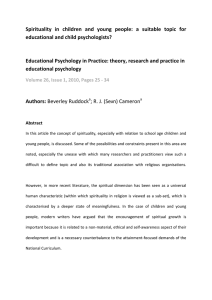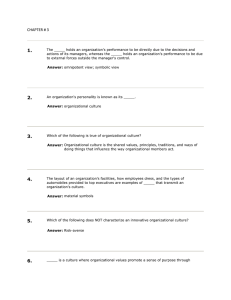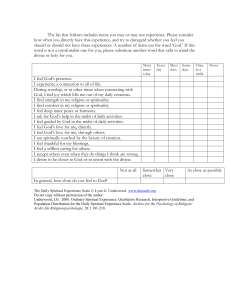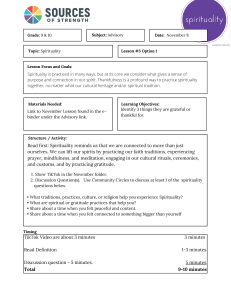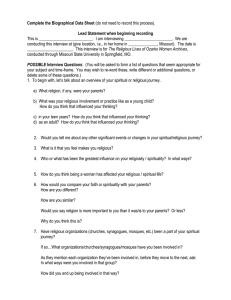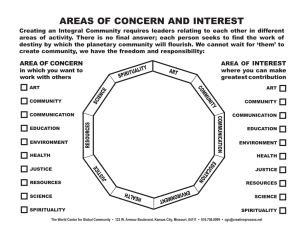Spiritual Quotient in ITES: Ethics & Job Satisfaction
advertisement
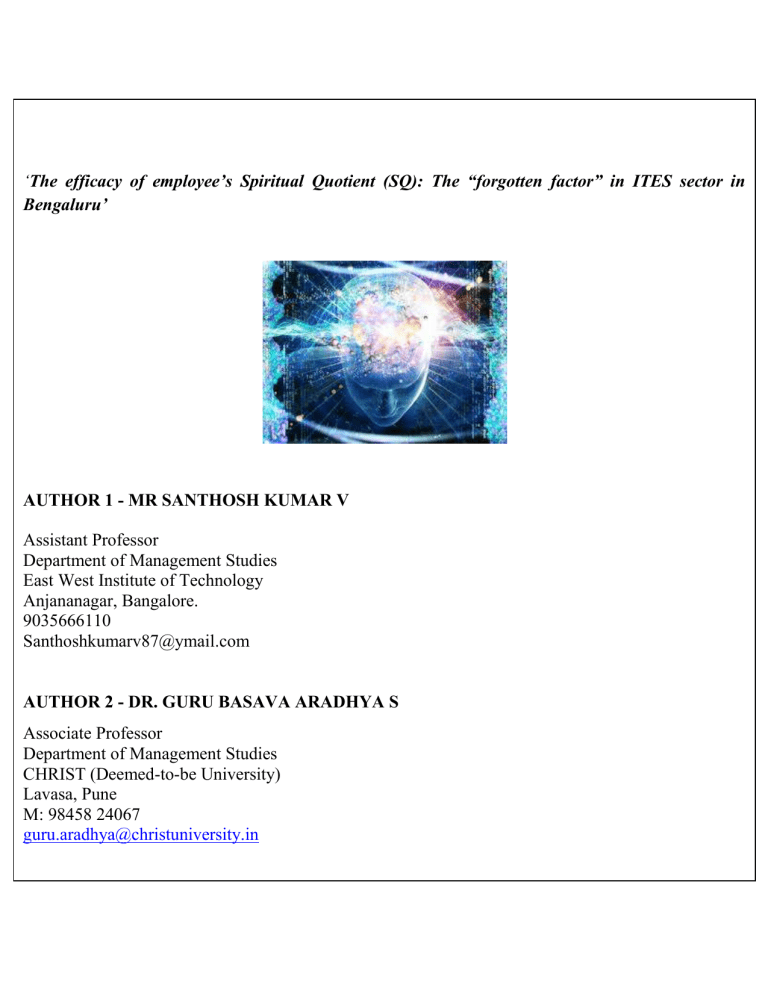
1. ABSTRACT 2. INTRODUCTION ‘The efficacy of employee’s Spiritual Quotient (SQ): The “forgotten factor” in ITES sector in Bengaluru’ 3. REVIEW OF LITERATURE 4. RESEARCH METHODS 4. a Research Design 4. b Objectives of the study 4. c Hypothesis result 4. d Data collection methods 4. f Statistical tool AUTHOR 1 - MR SANTHOSH KUMAR V Assistant Professor Department of Management Studies East West Institute of Technology Anjananagar, Bangalore. 9035666110 Santhoshkumarv87@ymail.com 4. e Scope of the Study 5. ANALYSIS & FINDINGS 6. LIMITATIONS 7. DISCUSSION & CONCLUSION 8. SUGGESTIONS FOR FUTURE AUTHOR 2 - DR. GURU BASAVA ARADHYA S RESEARCH Associate Professor Department of Management Studies CHRIST (Deemed-to-be University) Lavasa, Pune M: 98458 24067 guru.aradhya@christuniversity.in 9. REFERENCES 1. ABSTRACT ‘The efficacy of employee’s Spiritual Quotient (SQ): The “forgotten factor” in ITES sector in Bengaluru’ people are moral and consequently, profitable ethical assets to any organization. Population of this study will be Information Technology Enabled Services employees. The research design will be used in this Numerous adolescents over our nation study descriptive survey method. Primary harbour a typical dream, a fantasy to move and secondary data will be used for this from their home to have cosmopolitan life research and data will be analysed by using which urban appropriate statistical tools. The research communities. Cosmo towns that gives of paper tries to identify the relationship fantastic and enormous openings for work, between SQ, Ethicality and Job Satisfaction western culture, interesting individuals from in organization and if find any differences a mix of foundations and energizing choices would like to give suggestions. In the to make the most of their life. So it is little concluding part, results are discussed, both wonder that Bangalore turns up as the dream theoretical and business implications are venue for many across the country looking delineated, limitations of the study are to settle down to work in different sectors as highlighted well as in Information Technology Enabled proposed. implies greater, better Services(ITES). The sense of responsibility within the employees has been widely upgraded by the spiritual values, which Intensely bantered about subject in this cutting edge period is Spirituality. SQ has ‘our most fundamental intelligence. It is what we use to develop our capacity for meaning, vision and value. SQ helps us to live up to our potential for better, more satisfying lives. Most of the literary works proclaims the possibility that spiritual future directions are Objectives of the study will offer three major contributions directly made an impact on the ethicality in employees as well as job satisfaction. and To explore the relationship between employee’s spirituality at workplace and their job satisfaction. To know the efficacy of spirituality in workplace. To examine if there a positive impact of spirituality in the work place on the employees ethicality. Keywords: Spirituality, Job satisfaction, Ethicality, ITES sector, Bengaluru ‘The efficacy of employee’s Spiritual Quotient: The “forgotten factor” in ITES sector in Bengaluru’ 2. INTRODUCTION: A person's potential is a wonder and its drivers are not generally simple to understand. Therefore, identifying and understanding the potential and tapping it to meet organizational goals entails building an environment for it to prevail and grow. There is a change in perspective in elements of organization, the manner in which they work and an outcome the adjustments in the management theory and practices in the most recent decade. This adjustment in the organization incorporates a move from an absolutely financial concentration to an equalization of benefits for the administration, personal satisfaction for employees, spirituality inside the working environment and social duty. Employees have gotten disheartened, estranged and incapable to adapt to the compartmentalized idea of their work and non-work lives. So as to accomplish significance throughout everyday life (and along these lines in the person's working life), it appears to be essential for organizations to bring spirituality into the working environment. These emerging changes in the organization have additionally been called "the spiritual development" where the organization will create space for the spiritual measurement, which has to do with significance, meaning, reason, and sense of community. The explosion to create awareness of spirituality as another component of the management is one of the most critical patterns in the organization over a couple of decades. It is communicated that the spiritual measurement epitomizes employee’s quest for straightforwardness, meaning, selfarticulation, and interconnectedness to something higher. Spirituality gives people the steady expectation important to leave on the way of change and to bear the consistent mishaps in its manner intrigue. The organization have understood that so as to increase strategic competitive, they are required to continually beat their adversaries; and to have a better performing workforce they have than connect with their employees in a meaningful and spiritual way. Although interest on spirituality at workplace is growing rapidly, there is confusion around how spirituality influences job satisfaction and ethical values in organization. The values of a spiritual organization influences business and employees' arrangements. It is additionally shown that the spirituality of an organization influences results, for example, hierarchical execution, work fulfillment, employee attitudes, and ethicality in accomplishing objectives. It is additionally uncovered that it isn't adequate just to have a spiritual mission of purpose, yet rather that these spiritual based qualities ought to be entwined into business techniques, organizational cultures and strategic approaches. Spirituality in an organization can either be presented on an individual or organization level. More elevated levels of personal spirituality have regularly been related with positive results. However, from this study, it is clear if organizations are not ready to acquaint spirituality with the work environment on a management level, they are probably not going to discharge the maximum capacity bit of leeway of work environment spirituality. From the examination results, we offer the opinion that, so as to achieve spiritual transformation in an organization, more accentuation ought to be given to the advancement, usage, and consolation of spirituality on an organizational than what has recently been thought of. This may include essential changes for the organization’s way of thinking, vision, reason, and strategic the embedding of spiritual qualities in the association. The dynamic and progressively competitive worldwide business condition inside which organizations work necessitates that all roads and instruments ought to be investigated so as to improve hierarchical execution and occupation fulfillment. Spiritual quotient increases an individual’s capacity to understand others at a higher level. Many organizations started various sessions and programme to teach their employee art of living, aromatherapy, healing therapy and yoga classes etc. Modern spirituality is concerned with values, beliefs, convictions, every day practices, and implications by which individuals live. It expounds the thoughts of an extreme or insignificant reality. Ethics is one’s moralistic judgment’s about right and wrong. Decision seized inside an organization might be created by the individual or gatherings, but whoever makes them will be motivated by the culture of the organization. The decision to enact ethically is the moral values. Ethical esteem, on the other hand, when one lives as shown by it, adds to the flawlessness or flourishing of the individual as a person. Along these lines, moral esteems are objective. Endeavouring to obtain bravery, quietude and genuineness, courage, quietude, and validity would truly propel their humankind and along these lines make them an all the more appealing person. These objective good regards are known by human reason. The inclinations of human intuition, lead us to see what is helpful for the individual. Spiritual experiences have an indispensable part in building up the self of managers and accordingly in affecting the ethicality of their choices, on other hand spiritual practices diminishes the stress and gets moral conduct corporate world. The core values of spirituality are the moral values of the intensity that they simulate. Spirituality and job satisfaction have become common privilege now days. According to the growing body of research, the importing of Spiritual Values and ethics within the workplace has a positive impact towards increasing the productivity and profitability as well as job satisfaction, employee retention, customer loyalty, and brand reputation. In addition, spirituality has become the explicit way to upgrade loyalty and build-up moral ethics at the workplace. What is SPIRITUALITY & SPIRITUAL QUOTIENT The term Spirituality comes from Latin word “spiritus” or “spiritualis” that means breathing, breath, air or wind (MerriamWebster). Spirituality has characterized as "the one of a unique inner quest for the fullest self-improvement through support into the transcendent mystery. In easier terms spirituality is characterized as our inner consciousness. Spirituality is used as equivalent to religion, beliefs, ethical values and traditions. Spirituality is not official, structured or organized. It defines the totality of experiences of every person to find the truth and its principles. Spirituality is not directly linked to religion or any belief system. Spiritual Quotient is the capacity to get to more profound importance and numerous methods for knowing to see and take care of or resolve the correct issues. Its attributes include: being completely present, working out of qualities/reason, posing the inquiry behind the inquiry, welcoming differing and conflicting perspectives, coordinating left and right cerebrum reactions into an entire mind approach and moving from "I" to "We." SQ consists the values like benevolence, generativity, humanism, integrity, justice, mutuality, receptivity, responsibility, respect and trust. Presence of these values in organization makes that more spiritual. Workplace spirituality also influences the employee motivation, commitment and adaptability of employees towards organizational change that enhances the job satisfaction and ethicality in organization. Workplace spirituality has been defined as ''Workplace spirituality is a structure of authoritative qualities confirm in the way of life that advances employees' understanding of transcendence through the work procedure, encouraging their feeling of being associated with others in a manner that gives sentiments of culmination and happiness. SQ, or otherworldly insight, supports IQ and EQ. Profound insight is a capacity to get to higher implications, values, withstanding purposes, and unconscious aspects of oneself and to embed these implications, qualities, and purposes in living more extravagant and increasingly imaginative lives. Indications of high SQ incorporate a capacity to thoroughly consider the container, modesty, and an entrance to energies that originate from something past the inner self, past just me and my everyday concerns Why this surge of inclination in spirituality at the workplace? Emphasizing the concept of spirituality in organizations shows the move from the current paradigm to the spiritual worldview. While the spiritual worldview underscores spiritual standards and practices, the advanced worldview has a comprehension of intelligent and mechanistic values, logically assessing and sorting employees. The spiritual workplace helps employees to find meaning and purpose of their lives, in other words, the personal values. For this reason, today, attaching importance to spiritual values is regarded as a new sense of competition and is considered to be unique and intangible sources of organisations. The most substantial reason of the importance attached to spirituality in the workplace is the fact that it is no longer sufficient for the employees to contribute to their workplaces only with their minds and bodies and it is essential that they contribute with their souls. In other words, the main objective is to ensure the contribution of employees to the workplace with their whole potential. In addition, the aim is to value the entirety of the employees' characteristics, to enable them to re-connect with themselves and thus contribute to the organisation and to the society. Attaching importance to spirituality in the workplace enables employees to motivate their life force and energies towards work-related matters, and when met with obstacles, enables them to act with a fighting spirit to overcome the problems. In organizations, for the conveying of spiritual values to employees, importance is attached to the adoption of personal purposes, missions and values. In other words, the organisational milieu guides the spiritual development of the person. The adoption of spiritual values by the organisation and its transfer to employees develops ethical behaviour, enables empowerment and creates possibilities for better leadership. In order to be a spiritual workplace, it is not enough to mention it only in mission statements; the organisation should establish a system in which the employees would use their whole potential, ensure spiritual growth and perform at an optimum level. In other words, the organization, by defining its values, priorities and principles concerning spiritual wellbeing, announces it to its employees, suppliers and external environment. Spirituality in the work environment is about (I) individuals who see themselves as energetic creatures, whose spirits want and should be energized through work, (ii) encountering genuine reason and significance at work past checks and execution audits, (iii) individuals sharing and encountering some normal connection, fascination, and fellowship with one another inside their work unit and the organization as a whole. Most organizations are less interested in concepts and ideologies with normative necessities than those with a demonstrable positive impact on workplace attitudes and outcomes. Thus, to legitimize spirituality at the workplace, this study will empirically investigate the influence of workplace spirituality on ethicality and job satisfaction. 3. LITERATURE REVIEW According to THE HINDU (2019), a newspaper published from Delhi, states – The human body is itself used as a teaching point, and it is shown that there are five sheaths of koshas in which self is manifested as the Jivatma. They are food (Anna), life (Prana), mind (Manas), intelligence (Vijnana), and bliss (Ananda). The individual Self is the microcosm representing the different aspects of the universe, the macrocosm. Just as one has to cross many thresholds to perceive the deity in the sanctum or sanctorum, the individuals have to penetrate through the sheaths in the body to realize the Self within. The pupil gradually understands that each of these is a vital aspect of the universe. McLaughlin (2018) stresses the connection between job satisfaction and spirituality by stating, "a developing movement across the nation over is advancing spiritual qualities in the working environment and highlighting numerous instances of expanded efficiency and benefit". McLaughlin said that organizations that needed to make due in the 21st Century should offer a more prominent feeling of significance and reason – key components of spirituality, to their workforce. The author worries, "in the present profoundly serious condition, the best ability searches out organizations that mirror their internal qualities and give chances to self-awareness and community service, not simply greater pay rates". McLaughlin further clarifies that the utilization of spiritual values as core values has numerous positive monetary impacts on business. Srivastava's (2017) statement at HR zone March 2017 matters as a response to organisations' question on where to start spirituality. “The first thing that needs to happen is to make it safe and permissible to talk about it (spirituality), as normal and as naturally as the many other conversations we have at work, such as profitability, innovations and personnel issues. However, spirituality is becoming more openly recognised as an integral part of work". Ahmad M Mahasneh et al. (2015), this study was aimed at recognizing the degree of spiritual practices and its relationship with character attributes among a gathering of Jordanian college undergraduates. The most significant finding that can be drawn from this investigation was that a constructive and factually noteworthy relationship exists between spiritual insight measurements (basic existential reasoning, individual importance creation, supernatural mindfulness, and cognizant state extension) and character qualities (neuroticism, extraversion, openness to experience, pleasantness, and conscientiousness). Kumari (2013) observes, - Man is basically a spirit. The spirit in man is the focal reality. It isn't the physical body or indispensable life form, the psyche, or the will, yet something which underlies them all and supports them. It is essential and foundation of our being, the all-around that can't be decreased to either recipe. The spirit isn't a substance. It is something in itself and without anyone else, and can't be contrasted with any substance, abstract or target. It outfits solidarity in assorted variety, likewise in distinction and concordance in friction in man. Chand P. and Koul H. (2012) inferred that administration from numerous points of view isn't only a science yet sheer craft of imparting spirituality and feeling of possession in individuals to give their best to the wok exercises so as to pick up fulfilment and be less stressed. The scriptural message "Do unto others as you would have them do unto you" is the core value of this workmanship and if individuals follow this guideline, the organizations would be better, making one’s life simpler. At the end of the day, spirituality, organizational enthusiastic proprietorship and employment fulfilment have a negative relationship with work pressure and workplace spirituality is a significant indicator to adapt up to work pressure. These indicators with regards to work environment ought not to be dismissed as it helps in directing and decreasing work stress. 4. RESEARCH METHODS 4. a Research Design: The research design used in this study is a descriptive research method and will encompass research on the efficacy of employee’s Spiritual Quotient (SQ) as a “forgotten factor” in Bengaluru. The survey will include employees of ITES sector. 4. b Objectives of the study: To explore the relationship between employee’s spirituality at workplace and their job satisfaction. To know the efficacy of spirituality in workplace. To examine if there a positive impact of spirituality in the work place on the employees ethicality. 4. c Hypothesis result H1: There is a significant relation between employee’s Spirituality at workplace and their Job satisfaction, exemplified in ‘ethical values, tradition of organisation and work engagement with job satisfaction’ H2: There is significant association between the spiritual quotient, ethicality in archiving the goals, manifested in experience, inclusiveness and holistic with peaceful state of consciousness. Job satisfaction clarifies how an employee views or perceives all the aspects of their work understanding. Studies demonstrate that employees who feel their spiritual needs are tended at work will more likely develop, accomplish, and experience fulfilment than the individuals who neglect to feel the same 4. d Data collection method Sampling design – Survey method has been used to collect information with the help of questionnaire by using 5point Likert scale Sample size – 26 respondents were middle level managers working in ITES sector in Bengaluru Sampling technique - The sampling technique used in this study is purposive sampling, is a type of non-probability sampling technique. This technique is used based on characteristics of the sample population and on objectives of the study. 4. e Statistical tool – Results are drawn by using Anova single factor 4. f Scope of the Study 1. Respondent’s scope – It comprises of data randomly selected respondents i.e. employees working ITES in Bangalore. 2. Content scope – It consists of the behaviour and observation found in the respondents using PCA to quantify and ascertain the qualitative perspective. 3. Regional scope –The study is conducted within the region limits of Bangalore. 4. Research scope – This study is carried out in accordance with the mentioned objectives viz exploring the link between employee’s spirituality at workplace and their job satisfaction, to know the efficacy of spirituality in workplace and to find out the link between SQ and ethicality in achieving goals 5. ANALYSIS & FINDINGS Most of the employees strongly agree cosmology of spirituality encompasses employee identity, membership, ethical values and purpose in the organization. Respondents acknowledge that spiritual encounters help the individual to raise above his/her narrow self-conception and empower him/her to practice real empathy with others and to take an all-compassing perspective. Spirituality is tied in with "turning into an individual in the fullest sense" as one really quests for their definitive worth. It aids organization to focuses on meaningful work and engagement, providing purpose and job satisfaction to employees. Because of the interlinked spiritual values, organizations and employees will go for shared trust, giving advantages from the two sides as far as organizational well as an individual. Interpolation between organization and spirituality plays a central role in many of the organizational problems but also would be a valuable contribution to help solve many problems. H0: µ1=µ2=µ3 H1: µ1≠µ2≠µ3 As the P- value is less than significant level @ 95%, and at the α value0.05 (0.035<0.05); we can reject he null hypothesis and accept the alternative hypothesis. Therefore we can infer from the test statistics that ‘There is a significant relation between employees Spirituality at workplace and their Job satisfaction, exemplified in ‘ethical values, tradition of organisation and work engagement with job satisfaction’. H2: There is Significant association between the spiritual quotient, ethicality in archiving the goals, manifested in experience, inclusiveness and holistic with peaceful state of consciousness. q10 q11 q10 1 q11 0.234931 1 q12 q13 Anova: Single Factor SUMMARY Groups q1 q2 q3 Count 26 26 26 Sum 88 64 71 ANOVA Source of Variation SS df Between Groups 11.71795 2 Within Groups 125.7308 75 Total 137.4487 77 Average 3.384615 2.461538 2.730769 Variance q12 1.926154 1.378462 1.724615 q13 -0.08834 0.217812 1 -0.25293 0.188574 0.531868 1 Since the majority of the respondents are MS F positively P-value crit correlatedF to the premise viz., that the there is Significant association between 5.858974 3.494953 0.035382 3.118642 the spiritual quotient, ethicality in archiving 1.67641 the goals, manifested in experience, inclusiveness and holistic with peaceful state of consciousness’. Graphically we can explain each parameter in the study as below. 16 14 12 10 q13 8 q12 6 q11 4 2 0 44525342134113244523452412 MAJOR FINDINGS Research study was conducted across employees working at ITES in Bengaluru and some interesting findings could be deduced. a. Majority of the employees accepts the growing work diversity and spiritual influx has led to confluence of shared ethical accents across the work culture. b. Through this research we have found that employees had sought meaning and purpose in their work, succor (relief) from pressure and uncertainty, finding that often in their work traditions with the help of SQ. c. To improve the ethicality in organization we should enhance the development of the self of decisionmakers toward a more inclusive, holistic and peaceful state of consciousness. d. Spirituality in organization focuses on meaningful work and engagement, providing purpose and job satisfaction to employees. e. Employees who can bring their spirituality to work are better able to equip their organization to meet unique and personal demands of the company. f. Spiritual experiences helps the person to transcend his/her narrow self-conception and enable him/her to exercise genuine empathy with others and to take an all compassing perspective g. Interpolation between organization and spirituality plays a central role in many of the organizational problems but also would be a valuable contribution to help solve many problems 6. LIMITATIONS In spite of positive results, this study has some limitations which have to be acknowledged. Firstly, selection of the sample for the study involves employees of ITES working in Bangalore. Hence generalizations of the results may not be possible until the sample includes different sectors and in other region as well. Secondly, despite the fact that causality is expected that organizational spirituality prompts job satisfaction, this bearing of connection has not been built up. In spite of the fact that it is theoretically conceivable that the course of causality is from job satisfaction to organizational spirituality. 7. DISCUSSION AND CONCLUSION Spirituality helps and includes a quest for the importance of life, solidarity, for connectedness, for greatness, a mystery power, and for the most elevated of human potential. In the Hindu philosophy during 19th century, Vivekananda added Raja Yoga, the way of contemplation and meditation in a spiritual practice as the path of cultivating necessary virtues of self discipline, meditation, contemplation and elf refection sometime with isolation and renunciation of the world which is called as a state of Samadhi that is ultimate experience. The spiritual organization can give significant work to those employees who have a requirement for spiritual fulfilment. Not exclusively will this make positive sentiments and feelings in employees, yet the spiritually based organization will create job satisfaction and seemingly, numerous other positive organizational results. To ensure that an organization is genuinely changed into a work environment that is spiritual, employees are required who will live out the spiritual qualities of the organization. A steady and purposeful show of qualities, morals is the driver of employees' effectiveness. In the organization, the compelling employees know about their values and act as per them so an atmosphere of transparency and trust could be made and that prompts job satisfaction. This study was aimed to find the relationship, between the SQ, job satisfaction at the workplace and ethicality to achieve the goals of the organization. The results as evidenced from the responses reveal that spirituality in the workplace has a significant influence on the job satisfaction and the hypothesis is consistent with the study by giving results of significant relation between employee’s Spirituality at workplace and their Job satisfaction, exemplified in ‘ethical values, tradition of organisation and work engagement with job satisfaction’. Confirmation of the hypothesis implies that managers of the organization should prepare an appropriate atmosphere in the workplace and increase spirituality in order to improve employee job satisfaction, ethicality, moral standard, employee identity, holistic and peaceful state of consciousness etc., For an employee working in a ITES that focuses on spiritual values such as sense of purpose, acceptance, trust, respect, understanding, appreciation, helpfulness, encouragement etc., the aim is that he/she develops his/her spiritual awareness, possesses a spiritual way of thinking, feels deeply the values belonging to him/her and to the organisation, and reflects all these as creativity, performance and success on his/her endeavours within the organisation. The existence of spirituality in the workplace enables the employees to manifest a thriving mental, physical and spiritual development and this situation ensures positive results for the employee himself/herself and for the organization. 8. SUGGESTIONS RESEARCH FOR FUTURE Further researchers are encouraged to drive the subject of spirituality or SQ in the workplace by conceptualizing and measuring spirituality in the workplace in other industries and organization through qualitative and quantitative approach. In addition, future investigations ought to investigate how to move organizations from spiritual values in authentic articulations being embraced values, to become principal convictions and organizational presumptions. This may incorporate researching the important job of having pioneers that are spiritual in the organization so as to ensure that spirituality is effectively coordinated in the organization. Different perspectives that could be explored are the means by which various employees encounter workplace spirituality and the effect of workplace spirituality on their particular employment fulfillment and different streams too. 9. REFERENCES Aravamudhan, N.R. & Krishnaveni, R. Spirituality at Work Place- An Emerging Template for Organization Capacity Building? Purushartha Journal, Vol. VII. No. 1, 63-78, 2014. Chand, P. and Koul H., Workplace Spirituality, Organizational Emotional Ownership and Job Satisfaction as Moderators in Coping with Job Stress. International Conference on Humanities, Economics and Geography (ICHEG'2012) 2012. Danah Zohar “Spiritual intelligence: a new paradigm for collaborative action” Garg, N. (2017). Workplace Spirituality and Employee Well-being: An Emprical Exploration. Journal of Human Values. 23(2), 129-147, 2014. Gupta, M., Kumar, V. & Singh, M. Creating satisfied employees through workplace spirituality: A study of the private insurance sector in Punjab (India). Journal of Business Ethics. 122, 79-88, 2014. Kumari S., Radhakrishnan View’s on Natularism and Humanism S. Journal of Social Research, Vol.-1(2) p-149, 2013 McLaughlin, C., “Spirituality at Work”, The Bridging Tree, 1, March, 17, p.11, 1998. Pethe, A. Workplace Spirituality. DMIETRJournal on Management Outlook, 1 (1), 1523, 2011. P.Moitreyee and S. P. Chandra, “Workplace Spirituality –The Essence of Modern Business Organizations”, Abhinav National Monthly Refereed Journal of Research in Commerce & Management, 4(3), 50-56, 2015. Raju, T. and Prabhu, R, Organizational Behaviour. Wiley India private limited, 1st edition, 2013. Sharma, A. and Raney, V. Role of Spirituality at Workplace. Sansodhan Chetnaa, 3(1), 24-35, 2014 Sibhadeep Mukherjee, Eureka Journals “Employees Perception of Spirituality in the workplace-a case study of IT. industry” 2017. Smith, J. P. The effects of self-efficacy and spirituality on the job satisfaction and motivation to lead among redeploying soldiers as moderated by transformational leadership. Regent University. 2011. Srivastava, R. Spiritual well-being at work: how to do it right. HRZone, https://www.hrzone.com/lead/culture/spiritu al-wellbeing-at-work-how-to-do-itright.Retrieved from: 07.11.2017. THE HINDU “Religion and spirit of enquiry” Delhi. Newspaper, 2019. THE TIMES OF INDIA “What is Spiritual Intelligence” retrieved from newspaper, 2010 Vineet, K. and Kumar, S. Workplace spirituality as a moderator in relation between stress and health: An exploratory empirical assessment. International Review of Psychiatry, 26(3), 344–351, 2014. Wigglesworth, C. SQ21: The 21 skills of spiritual intelligence. New York: Selected Books, 2012. Zohar, D., & Marshall, I. SQ—Spiritual intelligence, the ultimate intelligence. London: UL copy, 2000.
